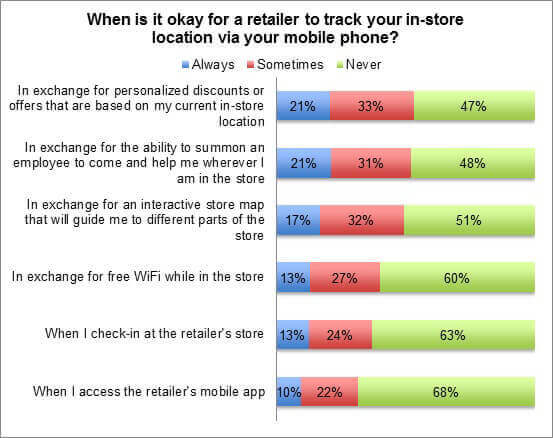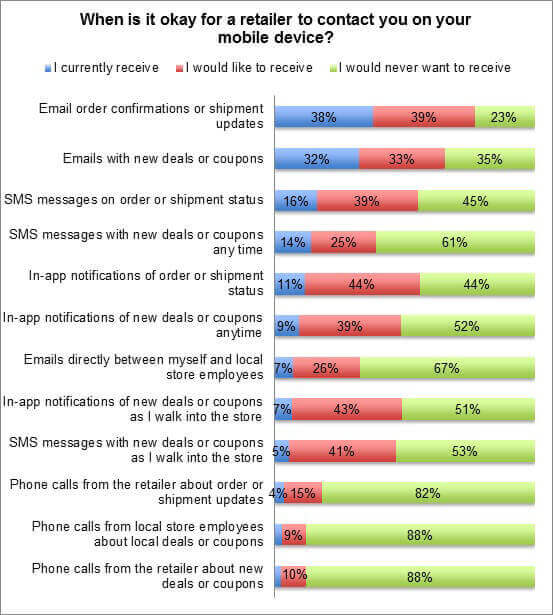Who’s Concerned about Consumer Privacy? Part II
Back in September, I wrote a Retail Paradox Weekly (RPW) piece about privacy and consumer data ( “Who Is Concerned About Consumer Privacy? “, 9/17/13). The net of that piece was that:
… there’s tension in the air when it comes to consumer privacy. And so I was glad to see a piece in Adage.com, that covered a speech by Julie Bernard, senior VP-customer Strategy, Marketing and advertising of Macy’s… (who pointed out that) “relevance ” trumps consumer concerns about privacy, she also pointedly stated that although Macy’s could ‘track every phone that came into Macy’s without announcing to people’, they choose not to.
It was a refreshing instance of someone standing up for consumer privacy.
Last week, the Future of Privacy Forum and U.S. Senator Chuck Schumer (New York) announced an agreement “to Ensure Consumers Have Opportunity to ‘Opt-Out’ Before Stores Can Track Their Movement Via Their Mobile Devices “. This agreement, which was co-sponsored by a number of technology and media companies, establishes a code of conduct for retailers to follow to help ensure that consumers are not tracked without their knowledge by technologies that can sense the location of mobile phones. Many retailers in recent times have been experimenting with such technologies in order to put timely and context-sensitive offers in front of their customers at just the right time, while they are in the store making their selections.
The announcement is serendipitous with an RPW column that my partner Nikki Baird wrote on September 10th entitled, “Privacy and Stores: The Coming Storm “. In the article, she wrote:
“Why do customer tracking systems give me the creeps? Well, first, it’s not all of the tracking solutions that creep me out. The ones that I like the least are the ones that sniff out MAC addresses over Wi-Fi. It’s sneaky in an underhanded kind of way, and the most open to abuse… the information being collected is way too detailed and it’s being done without providing enough information back to consumers about what information is being collected, and what the retailer intends to do with it. … And there’s no opt in. There’s no ‘Check here that you understand our privacy policy’ as you walk in the door. Yes, the information being collected is currently being used for relatively benign purposes – to sell you more stuff – but it would be all too easy to start using that information way beyond ‘providing relevant messages to the consumer’. … Retailers need to be firm with tech vendors about respecting consumers – respecting their privacy, and treating them like people instead of like cookie jars of data just waiting to be raided. And technology vendors need to take a leadership role in addressing privacy concerns, instead of offloading them onto retailers. “
So in an indirect way, the Future Of Privacy Forum announcement addresses half of Nikki’s concern – the part about technology partners taking a leadership position. The question now is, which retailers (aside from Macy’s) are going to respond in like manner? That’s the question
What Does the Consumer Actually Want?
While senators, privacy wonks, and industry watchers express concerns about consumer privacy (especially as relates to tracking movements via smart mobile devices), its good to get the point-of-view of the targets for all of this interest and concern. When in doubt, ask! And that’s just what RSR did, to a consumer panel of about 1200 participants. The results are revealing.
The first chart (below) gives some indication of the mental equation that consumers make about being tracked while in the stores. Almost ¬Ω don’t want it under any circumstances, but for the rest it’s conditional on what they get in return for giving up some privacy. Over ¬Ω are okay with it if they get an in-aisle discount or offer, or if they can summon a sales associate for help. And almost ¬Ω would like an interactive map that helps them to find what they are looking for. Conversely, if the value is perceived as low (like free WiFi – which you don’t absolutely need if you have a cellular connection, or clicking on the retailer’s mobile app), consumers want anonymity.
Chart 1: Don’t Track Me … Unless You’re Giving Me Something

More generally, consumers put definite boundaries around if and how they want to be contacted on their mobile devices (Chart 2). They’re okay with e-mail offers (after all, that’s old-tech, and doesn’t require a retailer to track their movements). Consumers are also generally okay with getting order-status and shipment information, either via e-mail or SMS. Of course, that implies an “opt-in “; after all, it can only happen if a consumer has ordered something!
Phone messages of any kind are clearly frowned on, and even in-app or SMS messages about new offers are viewed askance by most people – except when they are in a store (and presumably very close to actually taking advantage of the value offered).
Chart 2: Relevancy Is Defined Very Narrowly

Generation Gaps
The panel data shows a few interesting attitudinal gaps depending on various factors, including age groups. For example, new deals offered via a retailer’s mobile application are much more acceptable to people in the 18-44 age groups than those 45 and up. Those kinds of attitudinal differences (there also differences between men and women, income brackets, and even whether the mobile device is a phone or a tablet) point out the need for retailers to never assume anything when it comes to digital tracking and direct communications.
Opt-In is the Way to Go
What this all boils down to, is that there has to be an opt-in. The Future Of Privacy Forum is a useful first step, but it doesn’t go nearly far enough. Asking consumers to trust that a voluntary code of conduct is being adhered to is asking a lot, probably too much.
